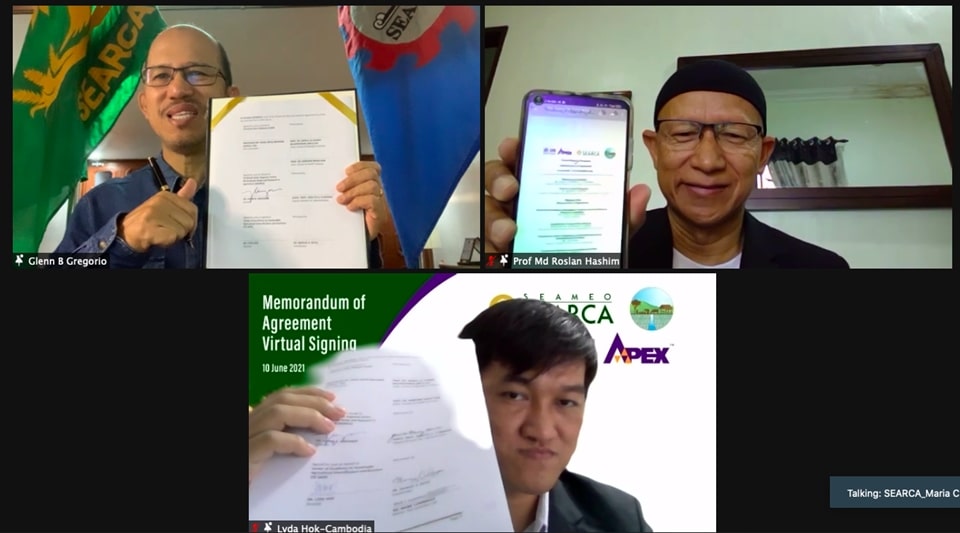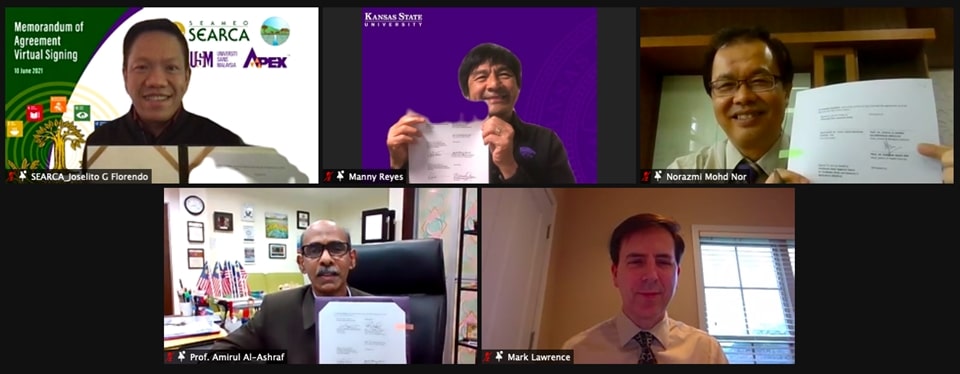SEARCA, Universiti Sains Malaysia (USM), and the Center of Excellence for Sustainable Agricultural Intensification and Nutrition (CE SAIN) of the Royal University of Agriculture (RUA) entered into an agreement for the project “Development of Innovative and Sustainable Aquafeed Using Local Agro-Residual Resources.” Officials from SEARCA, USM, CE SAIN-RUA, Sustainable Intensification Innovation Lab - Kansas State University, World Fish Center, and Feed the Future Innovation Lab for Fish - Mississippi State University, attended a virtual MOA signing on 10 June 2021 to formalize the partnership.
 Virtual MOA signing for the project “Development of Innovative and Sustainable Aquafeed Using Local Agro-Residual Resources” with SEARCA, USM, and CE SAIN – RUA.
Virtual MOA signing for the project “Development of Innovative and Sustainable Aquafeed Using Local Agro-Residual Resources” with SEARCA, USM, and CE SAIN – RUA.
Dr. Manuel R. Reyes, Research Professor at Kansas State University and Coordinator for Cambodia of the Sustainable Intensification Innovation Lab, provided an overview of the collaboration during the virtual MOA signing. Dr. Reyes mentioned that his institution is passionate about building the capacity of Cambodian nationals. Through this new collaboration, a joint scholarship will be provided for one constituent of RUA from AY 2021-2023 to study MS Aquatic Biology at USM. This is in response to the need of Cambodia for an aquatic science expert. The scholar is expected to contribute to CESAIN’s project funded by the Feed the Future Innovation Lab for Fish and enhance the capacity of RUA’s Faculty of Fisheries. For his part, Dr. Mark Lawrence, Director of the Fish Innovation Lab, highlighted the importance of fish in Cambodia in terms of providing livelihood and food and nutrition.
The scholarship study post, USM, is a premier research university that strives to enhance and strengthen its educational programs and has taken various initiatives to complement its educational excellence. The institution will provide funding for the research to be pursued by the scholar. Prof. Dr. MD Roslan Hashim, Deputy Vice-Chancellor (Sustainability and Institutional Development) of USM, thanked all the partners and reinforced their institution’s commitment to sustainability. He hopes that the partnership will eventually lead to development, social empowerment, industrial growth, and scientific progress.
 (Top L-R) Dr. Glenn B. Gregorio, SEARCA Director; Prof. Dr. MD Roslan Hashim, USM Deputy Vice-Chancellor; and Dr. Lyda Hok, Director, CE SAIN-RUA
(Top L-R) Dr. Glenn B. Gregorio, SEARCA Director; Prof. Dr. MD Roslan Hashim, USM Deputy Vice-Chancellor; and Dr. Lyda Hok, Director, CE SAIN-RUA
Dr. Lyda Hok, Director, CE SAIN, likewise conveyed his happiness for the collaboration as it would strengthen the capacity of RUA towards the development of their country. CE SAIN was established through the United States Agency for International Development Feed the Future Innovation Lab for Collaborative Research on Sustainable Intensification in 2016 at RUA, Phnom Penh, Cambodia. Its main intent is to foster private sector innovation, agricultural research, education and training, and public sector capacity building through improved collaboration and knowledge sharing. Also, it focuses on improving food and nutrition security while enhancing the quality of soil, water, and biodiversity. CE SAIN shall cover part of the scholar's stipend together with SEARCA. The latter will also provide other scholarship benefits such as international travel, tuition, insurance, and book and supplies allowance.
Dr. Glenn B. Gregorio, SEARCA Director, expressed his excitement for the project as the majority of SEARCA’s work tackles agriculture policy development and program advisory with limited projects in the field of aquaculture. It also aligns with the Center’s thrust of developing next-generation agriculture leaders and professionals through creating partnerships. With this new collaboration, SEARCA now offers 12 joint scholarship projects for nationals of SEAMEO member countries.
 (Top L-R) Assoc. Prof. Joselito G. Florendo, SEARCA Deputy Director for Administration; Dr. Manuel R. Reyes, Coordinator for the Sustainable Intensification Innovation Lab; Prof. Dr. Norazmi Mohd Nor, Dean of the School of Health Sciences, USM; (Bottom L-R) Prof. Dr. Amirul Al-Ashraf Balakrishnan Abdullah, Dean of the School of Biological Sciences, USM; Dr. Mark Lawrence, Director of the Fish Innovation Lab
(Top L-R) Assoc. Prof. Joselito G. Florendo, SEARCA Deputy Director for Administration; Dr. Manuel R. Reyes, Coordinator for the Sustainable Intensification Innovation Lab; Prof. Dr. Norazmi Mohd Nor, Dean of the School of Health Sciences, USM; (Bottom L-R) Prof. Dr. Amirul Al-Ashraf Balakrishnan Abdullah, Dean of the School of Biological Sciences, USM; Dr. Mark Lawrence, Director of the Fish Innovation Lab
This new partnership also supports SEARCA’s Institutional Development Assistance (IDA) to RUA. The IDA assists strategic higher education institutions with core competencies in agriculture-related disciplines to become catalysts of development in their countries. SEARCA’s recipients of IDA since its inception in 2011 include RUA, Savannakhet University in Lao PDR, Yezin Agricultural University in Myanmar, National University of Timor Leste, and Thai Nguyen University of Agriculture and Forestry in Vietnam. As of 2020, there have been 116 degree and non-degree recipients of SEARCA scholarships under the IDA program, and six capacity-building activities were conducted benefitting 162 individuals.